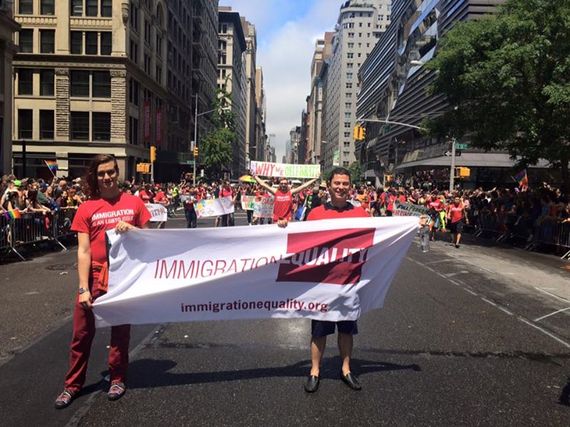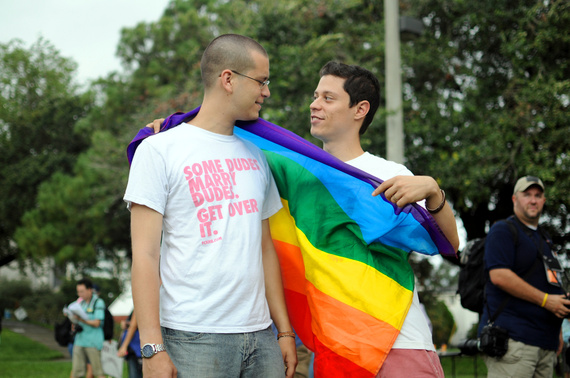Felippe and Isabel demonstrating at RNC in 2012 before the DOMA repeal, DACA and DAPA announcements
Within the immigrant rights movement, one of the first things that struck me around 2010 was the number of LGBT organizers who were not only helping, but were often in positions of influence within their organizations: At United We Dream's yearly networking event, the largest undocumented and ally meeting it in the country, it's on full display for those who wish to see. This group of LGBT undocumented immigrants would soon define themselves as "UndocuQueers."
At the same time, however, there were small corners where LGBT undocumented organizers would gather and vent their frustrations with their fellow UndocuQueers. Like my biracial friends who find complicated nuances in their acceptances in either group, Undocuqueer organizers find themselves divided between cultural worlds: one foot in a movement overwhelmingly speaking on behalf of and for Latinos, the other in the LGBT community, all while suffering the indignities of undocumented status.
Many of the issues that they face as a minority in either community is often compounded by issues affecting the other community; they are a minority within a minority within a minority often, being Latino, LGBT AND undocumented (though, obviously, Latinos are not the only ones that live this experience, i.e. Jose Antonio Vargas, an undocumented, LGBT Filipino immigrant whose writing and film have greatly advanced undocumented immigrants in media.)
In addition to all the pitfalls of being undocumented (no driver's license; no right to work; constant threat of deportation; cannot leave country to go to a wedding or funeral back home), they were in a more difficult position legally. This is because, before the Defense of Marriage Act (DOMA) was struck down, they couldn't have their marriages recognized by the government for immigration purposes. On top of this, the rate of rape for LGBT people in the already-sub-human conditions of immigrant detention is abysmal.
In addition to the many institutional horrors that undocumented LGBT people must suffer, there is also the family stigma. As immigrants who came with their families and no right to work, those in the undocumented community are often closer to and more dependent upon their family. This is especially true in their teen years when so many come out of the closet. Depending on their family's acceptance, this can create a nightmare scenario of being turned out with nowhere to go and a government often more likely to deport than help with any sort of emergency services.
If things weren't complicated enough in their undocumented community, while the LGBT community is known for being accepting, that doesn't mean that they got a pass on undocumented jokes; they can find themselves isolated by institutional barriers that the LGBT community often did not understand, while trying to fit into an immigrant community that often looks down on the LGBT community.
At a meeting for QUIP, the Queer Undocumented Immigrant Project, gay and trans folk would talk about how difficult they found it to be themselves. "You have to really tone the gay down," said one young man, with the rest of the room nodding. "There's still a lot of machismo and social conservatism in the Latino community that defines immigrant activism that can chafe against the LGBT experience," explained another organizer.
The organizers also talked about how they couldn't find work, and so everything from buying presents for birthdays to going out on a date was difficult. "And then, when you're out on a date and it goes well, you have nowhere to take them!" exclaimed one young gay man still living at home, with the rest of the room instantly erupting into laughter and agreement.
They also talked about coming out stories, and the parallels between coming out as LGBT and coming out undocumented. I've seen the nervousness and the seconds that drag on while the person coming out waits to see how you react to a basic, immutable fact about themselves that they know can torch bridges in an instant. Whether the coming out is as LGBT or undocumented, those nervous seconds are much the same.
In the end, this is a group of people who have been slandered ruthlessly, kicked to the bottom of many arbitrary, nonsensical social pecking orders that any bully feeds off of. This is as true of the bully in the sandbox as it is the bully in Congress or State Assembly.
Despite this, there have undeniably been great strides made for the rights of both the LGBT and immigrant community: DACA and DAPA as temporary measures from Obama for Dreamers and the parents of US Citizens; the repeal of DOMA; marriage equality and, of course, a VASTLY different attitude from the American public on LGBT issues in general.

Felippe and Isabel, marching @ NYC's Pride 2015 after DOMA repeal, DACA and DAPA announcement AND marriage equality in ALL 50 states
Occupying an impossible Venn diagram of discrimination, UndocuQueers still face daunting institutional and cultural barriers to success, however: an employer who would fire them the moment they find out they are gay; a government that will still deport them; a border patrol or ICE officer that will shoot them and not even have to file a report about it; a sub-human detention system that makes regular prison look downright pleasant where they can be tossed into at any moment.
The times have undeniably been improving at a rate that has not been seen in decades as societal change shifts into faster gear in the information age, and it's something to celebrate with an army of rainbow flags and body paint at a Pride rally. There is still, however, a lot more ground to cover before we even begin to approach social equality for this group. As we've seen in LGBT and immigrant rights in the past, we know that every last inch will have to be fought for.

